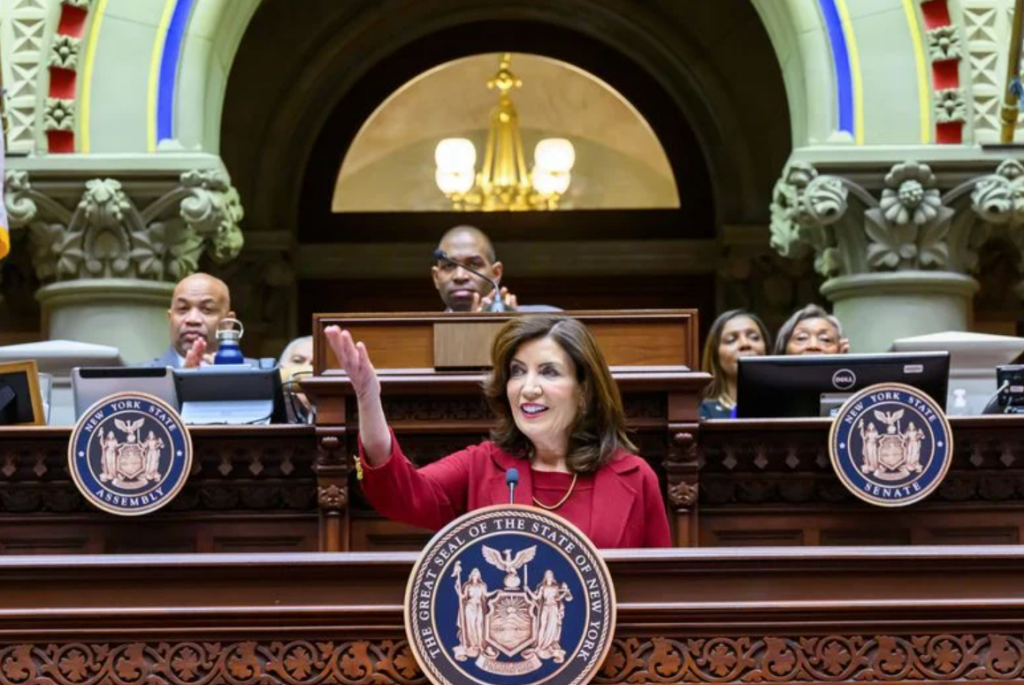Earlier this month, New York Gov. Kathy Hochul delivered her annual “State of the State Address.”
Gov. Hochul, speaking in the New York State Assembly Chamber, unveiled initiatives designed to make New York state more livable, affordable and safe. The address coincided with the release of the 2024 “New York, New Future” agenda, which outlined specific issues facing New Yorkers, including combating gun violence, mental health, affordable health care, the housing crisis and education.
The 61-minute address was given before a joint session of the legislature.
Reflecting on statewide progress since becoming governor, Hochul said that she looks forward to the future.
“The State of New York is stronger, healthier, safer and more affordable than it was two years ago when I became governor, but there is more work to do,” Hochul said. “Every proposal announced today serves to improve our state and ensure our communities are not just surviving, but that they are thriving. Our New York is our future, and the future is brighter than ever.”
Donna Lupardo, an assemblywoman representing Binghamton, Union and Vestal, said she would have liked to see a comprehensive anti-poverty strategy included in Hochul’s 2024 agenda. While parts of her plan address affordability, housing and the workforce, no plan specifically targets individuals experiencing poverty. Lupardo added that although an Upstate Cities initiative exists, certain details, including the eligibility of smaller cities like Binghamton, are currently unclear.
By population percentage, Broome County is the third-poorest county in the state, and Binghamton is the second-poorest city.
Following the Jan. 16 release of Hochul’s proposed budget for the 2024 fiscal year, Lupardo described its potential impact on the local housing crisis.
“We have housing shortages for all demographics and workforce shortages in every sector,” Lupardo wrote in an email. “We need to make sure the budget has specific strategies for overcoming barriers to employment in careers like child care, home care, nursing and the trades.”
New York State Sen. Lea Webb said that she was happy to hear that the Hochul supports many of her legislative priorities, including additional resources for domestic abuse survivors, investments in mental health resources and school-based mental health care. She added that renter protections must also be enacted to ensure affordable housing for all New Yorkers.
“Make no mistake, we have much work to do over the next months, especially on issues of housing, child care and other important policies,” Webb wrote in a statement. “I look forward to working with my colleagues to deliver a final budget that meets the challenges facing my constituents in the Southern Tier.”
Though locally elected Democrats expressed general support for Hochul’s agenda, Republican Rep. Marc Molinaro, who represents Greater Binghamton in the U.S. House of Representatives, criticized Hochul for neglecting to include the immigration crisis in her address. In a statement, he wrote that there are over 100,000 undocumented immigrants in New York City, which continues to attempt to bus more migrants to communities in upstate New York.
He added that in Congress, the Republican majority plans to reinstate the colloqiually-termed “Remain in Mexico” program and pass the Secure the Border Act, and New Yorkers need the weight of the governor’s office to compel President Joe Biden’s administration to address the crisis.
Atticus Fauci, the president of Binghamton University’s College Democrats and a sophomore majoring in economics, said that the proposed housing initiative would benefit Binghamton and ease fears surrounding housing insecurity, but wished for more emphasis on higher education.
“The housing supply aspect seems to focus mainly on [New York City], but other promises such as tenant protection via Good Cause eviction and other programs will be a huge win for all New Yorkers,” Fauci wrote in an email. “But there wasn’t a strong enough focus on the SUNY system as there should’ve been. I would like to see a lot more funding for this amazing and accessible option to education.”



